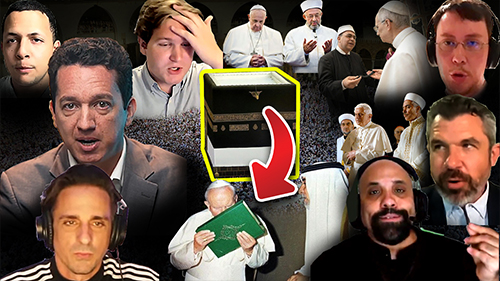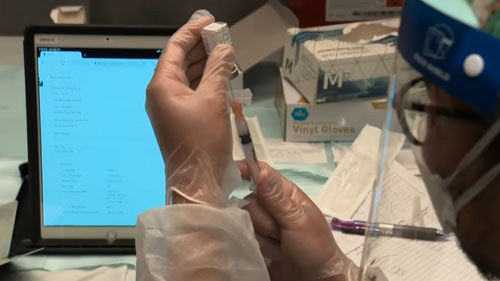| Recent Featured Videos and Articles | Eastern “Orthodoxy” Refuted | How To Avoid Sin | The Antichrist Identified! | What Fake Christians Get Wrong About Ephesians | Why So Many Can't Believe | “Magicians” Prove A Spiritual World Exists | Amazing Evidence For God | News Links |
| Vatican II “Catholic” Church Exposed | Steps To Convert | Outside The Church There Is No Salvation | E-Exchanges | The Holy Rosary | Padre Pio | Traditional Catholic Issues And Groups | Help Save Souls: Donate |  |









 " />
" /> " />
" /> " />
" /> " />
" /> " />
" />




Baptism of Blood and Baptism of Desire – Erroneous Traditions of Man
In this document, I have shown that the Catholic Church infallibly teaches that the Sacrament of Baptism is necessary for salvation. I have also shown that it is only through receiving the Sacrament of Baptism that one is incorporated into the Catholic Church, outside of which there is no salvation. I have also shown that the Catholic Church infallibly teaches that the words of Jesus Christ in John 3:5 – Amen, amen I say unto thee, unless a man be born again of water and the Holy Ghost, he cannot enter into the kingdom of God – are to be understood literally: as they are written. This is the infallible teaching of the Church and it excludes any possibility of salvation without being born again of water and the Holy Ghost. However, throughout the history of the Church, many have believed in the theories called baptism of desire and baptism of blood: that one’s desire for the Sacrament of Baptism or one’s martyrdom for the faith supplies for the lack of being born again of water and the Holy Ghost. Those who believe in baptism of blood and baptism of desire raise certain objections to the absolute necessity of receiving the Sacrament of Baptism for salvation. So, in order to be complete, I will respond to all of the major objections made by baptism of desire and blood advocates; and in the process, I will give an overview of the history of the errors of baptism of desire and baptism of blood. In doing this I will demonstrate that neither baptism of blood nor baptism of desire is a teaching of the Catholic Church.
THE FATHERS ARE UNANIMOUS FROM THE BEGINNING
In the first millennium of the Church there lived hundreds of holy men and saints who are called “Fathers of the Church.” Tixeront, in his Handbook of Patrology, lists over five hundred whose names and writings have come down to us.[1] The Fathers (or prominent early Christian Catholic writers) are unanimous from the beginning that no one enters heaven or is freed from original sin without water baptism.
In the letter of Barnabas, dated as early as 70 A.D., we read:
In 140 A.D., the early Church Father Hermas quotes Jesus in John 3:5, and writes:
This statement is obviously a paraphrase of John 3:5, and thus it demonstrates that from the very beginning of the apostolic age it was held and taught by the fathers that no one enters heaven without being born again of water and the Spirit based specifically on Our Lord Jesus Christ’s declaration in John 3:5.
In 155 A.D., St. Justin the Martyr writes:
Notice that St. Justin Martyr, like Hermas, also quotes the words of Jesus in John 3:5, and based on Christ’s words he teaches that it is from apostolic tradition that no one at all can enter Heaven without being born again of water and the Spirit in the Sacrament of Baptism.
In his dialogue with Trypho the Jew, also dated 155 A.D., St. Justin Martyr further writes:
In 180 A.D., St. Irenaeus writes:
Here we see again a clear enunciation of the constant and apostolic Tradition that no one is saved without the Sacrament of Baptism, from no less than the great apostolic father St. Irenaeus in the 2nd century. St. Irenaeus knew St. Polycarp and St. Polycarp knew the Apostle John himself.
In 181 A.D., St. Theophilus continues the Tradition:
In 203 A.D., Tertullian writes:
Notice how Tertullian affirms the same apostolic Tradition that no one is saved without water baptism based on the words of Jesus Himself.
Tertullian further writes in 203 A.D.:
Baptism has also been called since apostolic times the Seal, the Sign and the Illumination; for without this Seal, Sign or Illumination no one is forgiven of original sin or sealed as a member of Jesus Christ.
As early as 140 A.D., Hermas had already taught this truth – that Baptism is the Seal – which was delivered by the Apostles from Jesus Christ.
In the famous work entitled The Second Epistle of Clement to the Corinthians, 120-170 A.D., we read:
St. Clement of Alexandria, 202 A.D.:
Origen, 244 A.D.:
St. Aphraates, the oldest of the Syrian fathers, writes in 336 A.D.:
The same Syrian father further writes:
Here we see in the writings of St. Aphraates the same teaching of Tradition on the absolute necessity of water baptism for salvation based on the words of Christ in John 3:5.
St. Cyril of Jerusalem, 350 A.D.:
We see that St. Cyril continues the apostolic Tradition that no one enters heaven without being born again of water and the Spirit, based again on an absolute understanding Our Lord’s own words in John 3:5.
Many other passages could be quoted from the fathers, but it is a fact that the fathers of the Church are unanimous from the beginning of the apostolic age that no one at all can be saved without receiving the Sacrament of Baptism, based on the words of Jesus Christ in John 3:5. The eminent Patristic Scholar Fr. William Jurgens, who has literally read thousands of texts from the fathers, was forced to admit the following (even though he believes in baptism of desire) in his three volume set on the fathers of the Church.
The eminent scholar Fr. Jurgens is admitting here three important things:
The fathers are constant in their teaching that John 3:5 is absolute with no exceptions; that is, no one at all enters heaven without being born again of water and the Spirit;
The fathers are so constant on this point that it likely constitutes divine revelation, without even considering the infallible teaching of the popes;
The constant teaching of the fathers that all must receive water baptism for salvation in light of John 3:5 excludes exceptions for the “invincibly ignorant” or “physically impossible” cases.
And based on this truth, declared by Jesus in the Gospel (John 3:5), handed down by the Apostles and taught by the fathers, the Catholic Church has infallibly defined as a dogma (as we have seen already) that no one at all enters heaven without the Sacrament of Baptism.
But, as is the case with many other matters, not all of the fathers remained consistent with their own affirmation of the absolute necessity of water baptism for salvation.
NOT ALL OF THE FATHERS REMAINED CONSISTENT WITH THEIR OWN AFFIRMATION
Despite the fact that there is a constant tradition from the beginning that no one at all is saved without water baptism, not all of the fathers always remained consistent with their own affirmation on this point. And that is where we come across the theories of “baptism of blood” and “baptism of desire,” each of which will be discussed in turn. But it must be understood that the fathers of the Church were mistaken and inconsistent with their own teaching and the apostolic Tradition on many points – since they were fallible men who made many errors.
The fathers of the Church are only a definite witness to Tradition when expressing a point held universally and constantly or when expressing something that is in line with defined dogma. Taken individually or even in multiplicity, they can be dead wrong and even dangerous. St. Basil the Great said that the Holy Ghost is second to the Son of God in order and dignity, in a horrible and even heretical attempt to explain the Holy Trinity.
When St. Basil says above that the Godhead is one in Father, Son and Holy Spirit, he is correctly affirming the universal, apostolic Tradition. But when he says that the Holy Spirit is second in dignity to the Son he ceases to remain consistent with this Tradition and falls into error (material heresy, in fact). And the fathers made countless errors in attempting to defend or articulate the Faith.
St. Augustine wrote an entire book of corrections. St. Fulgentius and a host of others, including St. Augustine, held that it was certain that infants who die without baptism descend into the fires of Hell, a position that was later condemned by Pope Pius VI. As Pope Pius VI confirmed, unbaptized infants go to Hell, but to a place in Hell where there is no fire.[35]
But St. Augustine was so outspoken in favor of this error that it became the common and basically unchallenged teaching for more than 500 years, according to The Catholic Encyclopedia.
This is why Catholics don’t form definite doctrinal conclusions from the teaching of a father of the Church or a handful of fathers; a Catholic goes by the infallible teaching of the Church proclaimed by the popes; and a Catholic assents to the teaching of the fathers of the Church when they are in universal and constant agreement from the beginning and in line with Catholic dogmatic teaching.
The Catholic Church recognizes infallibility in no saint, theologian or early Church father. It is only a pope operating with the authority of the Magisterium who is protected by the Holy Ghost from teaching error on faith or morals. So, when we examine and show how Churchmen have erred on the topics of baptism of desire and blood this is 100% consistent with the teaching of the Church, which has always acknowledged that any Churchman, no matter how great, can make errors, even significant ones. Finally, after dealing with baptism of desire and blood, I will quote a Pope, who is also an early Church father, whose teaching ends all debate on the subject. I will now proceed to discuss baptism of blood and baptism of desire.
Endnotes:
[1] Tixeront, Handbook of Patrology, St. Louis, MO: B. Herder Book Co., 1951.
[2] Jurgens, The Faith of the Early Fathers, Collegeville, MN, The Liturgical Press, 1970, Vol. 1: 34.
[3] Jurgens, The Faith of the Early Fathers, Vol. 1: 92.
[4] Jurgens, The Faith of the Early Fathers, Vol. 1: 126.
[5] Jurgens, The Faith of the Early Fathers, Vol. 1: 135a.
[6] Jurgens, The Faith of the Early Fathers, Vol. 1: 219; 220.
[7] Jurgens, The Faith of the Early Fathers, Vol. 1: 181.
[8] Jurgens, The Faith of the Early Fathers, Vol. 1: 306.
[9] Jurgens, The Faith of the Early Fathers, Vol. 1: 302
[10] Jurgens, The Faith of the Early Fathers, Vol. 1: 92.
[11] Apostolic Fathers, translation by Kirsopp Lake, Cambridge MA: Harvard University Press, Vol. 1, p. 139.
[12] Jurgens, The Faith of the Early Fathers, Vol. 1: 712.
[13] Patrologiae Cursus Completus: Series Graecae, 46:417b, Fr. J.P. Migne, Paris: 1866; quoted in Michael Malone, The Only-Begotten, Monrovia, CA: Catholic Treasures, 1999, p. 175.
[14] Jurgens, The Faith of the Early Fathers, Vol. 1: 407.
[15] Jurgens, The Faith of the Early Fathers, Vol. 1: 501.
[16] Jurgens, The Faith of the Early Fathers, Vol. 1: 681.
[17] Jurgens, The Faith of the Early Fathers, Vol. 1: 683.
[18] Jurgens, The Faith of the Early Fathers, Vol. 1: 810a.
[19] The Sunday Sermons of the Great Fathers, Vol. 3, p. 10.
[20] Jurgens, The Faith of the Early Fathers, Vol. 1: 899.
[21] The Sunday Sermons of the Great Fathers, Vol. 2, p. 51.
[22] Jurgens, The Faith of the Early Fathers, Vol. 1: 910r.
[23] Jurgens, The Faith of the Early Fathers, Vol. 2: 1323.
[24] Jurgens, The Faith of the Early Fathers, Vol. 2: 1324.
[25] Jurgens, The Faith of the Early Fathers, Vol. 2: 1330.
[26] Jurgens, The Faith of the Early Fathers, Vol. 2: 1206; The Nicene and Post-Nicene Fathers, New York: Charles Scribner’s Sons, 1905, Vol. XIII, p. 197.
[27] Jurgens, The Faith of the Early Fathers, Vol. 3: 1536.
[28] Jurgens, The Faith of the Early Fathers, Vol. 3: 2016.
[29] The Sunday Sermons of the Great Fathers, Vol. 1, p. 89.
[30] The Sunday Sermons of the Great Fathers, Vol. 2, p. 412.
[31] Jurgens, The Faith of the Early Fathers, Vol. 3, pp. 14-15 footnote 31.
[32] Denzinger 861; Decrees of the Ecumenical Councils, Vol. 2, p. 685.
[33] Jurgens, The Faith of the Early Fathers, Vol. 1, p. 413.
[34] Jurgens, The Faith of the Early Fathers, Vol. 2: 940 .
[35] Denzinger 1526.
[36] The Catholic Encyclopedia, Volume 9, “Limbo,” 1910, p. 257.
[37] The Papal Encyclicals, Vol. 1 (1740-1878), p. 29.
[38] Denzinger 1320.
[39] The Papal Encyclicals, Vol. 4 (1939-1958), pp. 178-179.
Sign up for our free e-mail list to see future vaticancatholic.com videos and articles.
Recent Content
^